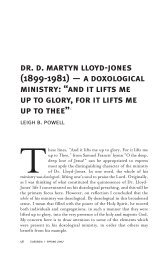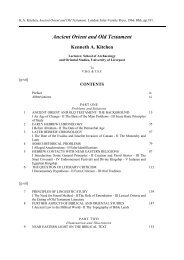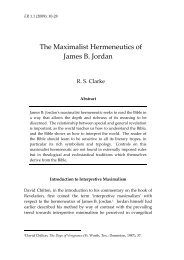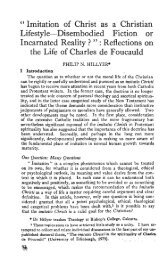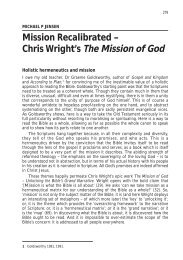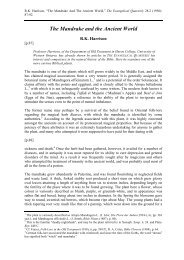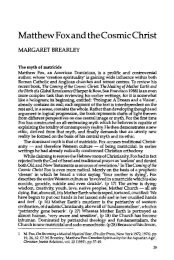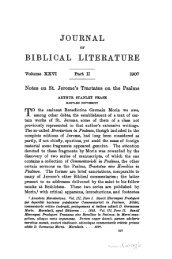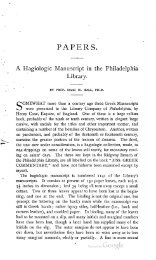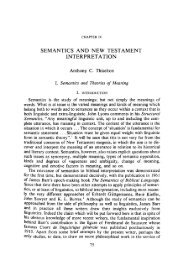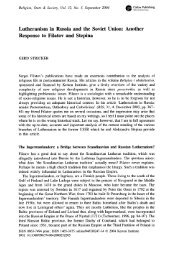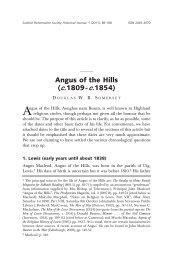The Language of the Epistle to the Hebrews as Bearing upon Its ...
The Language of the Epistle to the Hebrews as Bearing upon Its ...
The Language of the Epistle to the Hebrews as Bearing upon Its ...
Create successful ePaper yourself
Turn your PDF publications into a flip-book with our unique Google optimized e-Paper software.
LANGUAGE OF THE EPISTLE TO THE HEBREWS.<br />
I3<br />
It may be thought that all this tedious examination is not worth<br />
<strong>the</strong> trouble. It goes <strong>to</strong> show - what h<strong>as</strong> always been noticed by<br />
every reader - that <strong>the</strong> style <strong>of</strong> <strong>the</strong> epistle is unlike that <strong>of</strong> S. Paul;<br />
but if it also show, <strong>as</strong> it seems <strong>to</strong> do quite <strong>as</strong> clearly, that it is unlike<br />
that <strong>of</strong> S. Luke <strong>to</strong>o, something h<strong>as</strong> been gained. It makes it<br />
improbable, at le<strong>as</strong>t, that S. Luke wrote <strong>the</strong> epistle <strong>to</strong> give expression<br />
<strong>to</strong> <strong>the</strong> ide<strong>as</strong> and arguments <strong>of</strong> S. Paul.<br />
It remains now finally <strong>to</strong> examine words <strong>of</strong> ano<strong>the</strong>r cl<strong>as</strong>s. <strong>The</strong>re<br />
are many words and groups <strong>of</strong> words so peculiarly appropriated <strong>to</strong><br />
certain ide<strong>as</strong> or shades <strong>of</strong> thought, that <strong>the</strong> use or non-use <strong>of</strong> <strong>the</strong>m<br />
indicates pretty clearly <strong>the</strong> habitual thought <strong>of</strong> <strong>the</strong> writer. If he use<br />
<strong>the</strong>m habitually, <strong>the</strong> ph<strong>as</strong>e <strong>of</strong> truth which <strong>the</strong>y represent must have<br />
been one <strong>of</strong> its prominent <strong>as</strong>pects in his mind; or if he very seldom<br />
employ <strong>the</strong>m, <strong>the</strong>n that <strong>as</strong>pect <strong>of</strong> truth w<strong>as</strong> not <strong>the</strong> predominant one<br />
from his point <strong>of</strong> view. Such words or groups <strong>of</strong> words are <strong>of</strong> very<br />
different degrees <strong>of</strong> importance; but even those <strong>of</strong> inferior significance<br />
help <strong>to</strong> complete <strong>the</strong> picture <strong>of</strong> <strong>the</strong> writer's mental habits, and it is<br />
<strong>the</strong>refore well <strong>to</strong> examine all which are in any degree characteristic.<br />
<strong>The</strong> group aya-rdao, ayadrrJ, and aya7rrrog is noteworthy. <strong>The</strong>y are<br />
very common in <strong>the</strong> Pauline writings, but are rare both in S. Luke<br />
and in Heb. In fact only one <strong>of</strong> <strong>the</strong>m, ayai7ryro, occurs at all in <strong>the</strong><br />
Acts, and none <strong>of</strong> <strong>the</strong>m are ever used by S. Luke except in recording<br />
<strong>the</strong> words <strong>of</strong> o<strong>the</strong>rs. So also <strong>of</strong> <strong>the</strong> Heb. Of <strong>the</strong> 5 instances <strong>of</strong><br />
<strong>the</strong>ir use, two are in quotations from <strong>the</strong> LXX. <strong>The</strong>y are common<br />
enough in o<strong>the</strong>r writers, but are especial favorites <strong>of</strong> S. John. Of <strong>the</strong><br />
I54 instances in "o<strong>the</strong>r writers," 109 are in S. John, so that <strong>the</strong> words<br />
may be called Pauline and Johannean. <strong>The</strong>ir rarity in S. Luke and<br />
Heb. may be partly explained by <strong>the</strong> fact that aya,rr is an exclusively<br />
biblical word, and that ayaird-o also is used in a higher sense in <strong>the</strong><br />
sacred than in pr<strong>of</strong>ane writings. Still <strong>the</strong>y were common words in<br />
<strong>the</strong> Christian community, and <strong>the</strong>y mark a distinction in thought<br />
between S. Luke and Heb. on <strong>the</strong> one side, and S. Paul and <strong>the</strong><br />
rest <strong>of</strong> <strong>the</strong> N. T. on <strong>the</strong> o<strong>the</strong>r. <strong>The</strong> actual number <strong>of</strong> instances <strong>of</strong><br />
<strong>the</strong>ir use is: Heb., 5 times; S. Luke, 15; S. Paul, 35 ; all o<strong>the</strong>rs<br />
(Jno. I09), 154; but if we exclude from <strong>the</strong> enumeration all quotations<br />
from <strong>the</strong> LXX, and all record <strong>of</strong> <strong>the</strong> words <strong>of</strong> o<strong>the</strong>rs, <strong>the</strong><br />
numbers become: Heb. 3; S. Luke, o; S. Paul, I32; all o<strong>the</strong>rs<br />
(Jno. 43), 87. <strong>The</strong> comparison is <strong>to</strong>o obvious <strong>to</strong> call for proportionate<br />
numbers. As an appendix <strong>to</strong> this group it may be mentioned<br />
that LtXE'w never occurs in Heb., is used only twice by S. Luke, twice<br />
by S. Paul, and 21 times elsewhere, I5 <strong>of</strong> which are in S. John.




